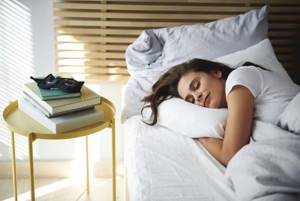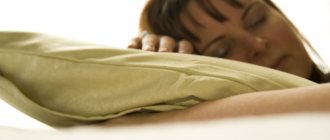Good sleep is an important condition for excellent health and well-being. Adequate sleep gives the body rest and the energy needed to deal with all the pressing problems during the day. If you have difficulty falling asleep, or you sleep unstably or often wake up at night, then perhaps a few useful tips will help you solve this problem.
Why we don't get enough sleep: 5 reasons
Poor sleep in most cases is the result of a number of habits that can and should be gotten rid of. Let's remember the 5 most common reasons for lack of sleep in modern life:
Sedentary lifestyle
Lack of physical activity and sedentary work negatively affect proper sleep. The body simply does not have time to get tired enough during the day, and the need to restore spent physical strength in the evening simply does not occur.
Habit of getting up late
If you are used to waking up after lunch, then your body will not need sleep in the next 22-23 hours. Even if you do hard physical work, go to the gym and train, your body will want to sleep no earlier than 2-3 am. You can use sleeping pills, but this will not solve all problems. Frequent use of medications can lead to chronic fatigue and even cause insomnia. It would be right to accustom yourself to getting up early - this is the first and important step to starting to get enough sleep.
Stress and anxiety
Stress, worries and worries experienced during the day will inevitably lead to a large number of unnecessary thoughts before bed. The brain is designed in such a way that emotional events need to be analyzed, and the best time for this is before bed. These thoughts will make it difficult to fall asleep and have a good night's sleep. Read about how to get rid of stress and stop being nervous in a separate article.
Habit of taking work home
With no work responsibilities to complete during the day, many try to finish work at home. This is the wrong decision. To get a good night's sleep, you need to rest at home. Remember - it’s better to start your working day a little earlier and try to get everything done than to take work home.
Using gadgets before bed

Modern man cannot imagine his existence without various gadgets. Their constant use negatively affects sleep. Try to stop using them at least an hour before bedtime. You will allow your body to relax and prepare for sleep.
Sleeping mode
How much sleep do you need?
Nature itself suggests the number of hours during which people get enough sleep, and their systems recover and return to normal. The average sleep requirement is 8 hours a day. A person feels normal when in the arms of Morpheus for 7 to 9 hours.
If you sleep for 4-6 hours for several days in a row, fatigue will accumulate, cognitive functions will deteriorate, and irritability will appear. Long-term, chronic lack of sleep over several months and sometimes years can undermine a person's immune system, seriously impair heart function and lead to depression and even mental disorders.

Proper, complete sleep is the basis of human health, and for women it is also a necessary condition for beauty
An excess of sleep (10-12 hours) is no less harmful to the human body, as is a lack. After such a long period of rest, people feel sluggish, overwhelmed and apathetic all day. Therefore, you also need to rest in moderation.
Sleep phases
Sleep consists of two main phases, alternating one after another. Phases of deep and shallow sleep. Scientists have established through observation that each phase lasts approximately an hour and a half. To feel well-rested, a person must wake up not in the middle of the phase, but after its completion. Therefore, sleep that lasts 6, 7.5, 9 hours will be more complete than 8 or 7 hours. From this calculation you can set an alarm. In this case, it is worth considering the time it takes to fall asleep. And this component is quite difficult to determine.
When to go to bed and wake up
A decline in brain and physical activity is usually observed in “larks” - by 21-22 pm, in “night owls” - by 23-01 at night. Therefore, on average, the majority of the population goes to bed at 22-23 hours. At this time, melatonin, the sleep hormone, begins to be actively produced.
Rising hours are 6-8 am. At this time, the body stops producing melatonin and begins to secrete hydrocortisone, which “wakes up” all internal systems.
Compliance with the natural regime of wakefulness and sleep helps a person to be constantly in good shape and in a good mood, improves performance, prolongs youth and improves health.
Negative consequences of lack of sleep
If a person constantly does not get enough sleep, then certain health problems may soon begin. The most common consequences of lack of sleep include:
- 1. Decreased immunity. The human immune system is directly related to sleep. Poor quality and short sleep reduces a person’s immunity, which will inevitably lead to colds, especially in winter.
- 2. Excess weight. With a lack of sleep, the body does not recover, and it requires additional energy in the form of food. Over time, this will lead to the appearance of extra pounds.
- 3. Bags under the eyes. This is one of the most common symptoms of sleep deprivation, and almost anyone who has trouble sleeping will experience the gradual appearance of dark circles under their eyes, which will only become more pronounced over time.
I think these are good enough reasons to try to train yourself to get a good night's sleep. Let's move on to the main part. As usual, I will ask you to arm yourself with a pencil and make a short summary of the recommendations that seem most suitable to you. Don’t put it off until tomorrow, use a few recommendations today - get rid of bad habits, establish a routine, and soon you will notice how you will begin to get enough sleep. Our course will consist of 3 consecutive parts. Well, shall we begin?
How to sleep correctly to lose weight and look younger
Share:
Sleep is an important component of health and youth, which few people pay enough attention to. Meanwhile, it provides increased immunity, high performance, stable concentration, strong memory, healthy nervous and cardiovascular systems, low levels of stress hormones, normal metabolism, and good mood. During proper and deep sleep, processes of cellular rejuvenation and self-healing of organs occur. And neglect of the regime can provoke various disorders, for example, migraines, nervous disorders, obesity and many others.
MEANING OF DREAM
Sleep is a natural state of the body, characterized by a shutdown of consciousness and a decrease in reactions to external stimuli. And this is not a waste of time, but a cure. It helps the body recover at the cellular level. During the day, cells perform their specific functions, and at night, intracellular processes are adjusted.
Also, during sleep, the immune system is restored, skin cells are regenerated, information is processed and stored (during sleep, the received data goes into long-term memory). In addition, the quality of sleep affects our performance and learning, circadian rhythms and lifestyle.
SLEEP AND HORMONES
The main hormone responsible for good sleep is melatonin. It regulates our circadian rhythms, depends on our regime and at the same time shapes it, because... makes us want to sleep at the right time for the body. It is produced most of all between 23 and 24 hours, and by 2 a.m. its effect decreases. That is why you need to fall asleep before 11 pm in order to have time to “catch” it. Moreover, this must be done in complete darkness.
In addition, melatonin gives us youth because it has antioxidant activity, normalizes blood pressure, participates in the functioning of brain cells, regulates the activity of the thyroid gland and improves immunity. When melatonin is produced normally, you protect yourself from problems with the cardiovascular system, diabetes and even oncology.
Melatonin also has a positive effect on the process of losing weight, since it stimulates the appearance of so-called “beige fat” in the body - a special type of fat cells that burn calories.
If melatonin is not produced, a person, of course, will still be able to fall asleep, but thanks to the substance adenosine. It has a similar effect, but the body produces it precisely as a product of real fatigue, a response to external stress.
The ideal sleep duration is 7-8 hours. It is during this time that our receptors are cleared of adenosine, and the concentration of melatonin becomes minimal, plus the body is completely restored.
In addition, we must remember that melatonin is associated with another hormone - serotonin, which is produced during the day as a “joyful” response to physical activity with a healthy intestine. If there is not enough serotonin, then problems with melatonin will also occur. Therefore, for good sleep you need to be active during the day and monitor the state of your gastrointestinal tract.
But too much appetite during working hours is an indicator that there is not enough sleep at night. The fact is that lack of sleep negatively affects the production of the satiety hormone - leptin.
Melatonin synthesis occurs through the eyes, so if you have vision problems, such as cataracts or conjunctivitis, there may be problems with the sleep hormone, in which case you should consider taking phytomelatonin.
Growth hormone is also synthesized during sleep.
CAUSES OF INSOMNIA
There are quite a few reasons for insomnia, some of them are beyond our control, while others we can easily influence.
One of the main factors is the general condition of the body. If a person suffers from chronic fatigue syndrome or anxiety, then most likely he will not be able to easily immerse himself in the arms of Morpheus. Somatic diseases and digestive problems can also cause insomnia. Advanced age is another aggravating factor. Therefore, often, in order to solve sleep problems, you must first address the general health of the body.
Another category of reasons is our bad habits. For example, problems with sleep can be caused by drinking tea and coffee, as well as eating at night, and external irritants (for example, a smartphone, TV, computer). Your mood is another factor that affects your sleep. When we experience strong emotions, anger, rage, or, conversely, intense joy, it is difficult to relax and fall asleep. For the same reason, exercising at night is also not recommended.
In general, sleep problems are quite common, which is why the World Association of Sleep Medicine was even founded, where the rules for healthy sleep were formulated. In addition, World Sleep Day was even established (the Friday before the Spring Equinox)
HOW TO SLEEP PROPERLY
Try to always go to bed at the same time. And in order to fall asleep quickly, you need to come up with a ritual before bed. This could be a contrast shower, meditation, aromatherapy, relaxing head and face massage, or reading books. Music therapy also has a good effect, for example, you can listen to “Moonlight” by Debussy, “Silence” by Beethoven or “Lullaby” by Brahms.
You also need to ventilate the bedroom, and ideally take a short walk outside. In this case, the air temperature in the room should be cool, about 20 degrees. It is also useful to use humidifiers.
In addition, you should not watch TV, phone or movies on the computer before going to bed. The fact is that the blue color of smartphones is perceived by the brain as daytime, so it can become overexcited, give you extra energy or ask for food. To reduce temptations, do not keep any equipment in the bedroom. In the evening, use night lights with red light, and just before going to bed, do not forget to close the curtains tightly.
And don’t forget that you can’t eat before going to bed, otherwise the body will be busy digesting food and not restoring. The last meal should be 3-4 hours before bedtime. As for drinks, herbal tea is good for the evening, but you should stop drinking water at 19:00. Coffee and black tea, as well as alcohol, should also be avoided in the evening.
In addition, at night, the hormone somatotropin is produced, which is responsible for burning fat. And after eating, insulin is released into the blood, which cannot be in our body at the same time as somatotropin. Accordingly, if you eat at night, excess calories will not be burned.
But as a preparation for bed, water treatments are perfect; a bath or shower will help relieve physical and emotional fatigue and tension.
An additional tool for quality sleep is the right pillow that will support your spine in the desired position. You can also apply a drop of essential oil, such as lavender, to help you fall asleep quickly. Or aromatherapy oils can be used in a diffuser. Other bedding (mattress, blankets, pajamas) should also be comfortable and of high quality. It’s not for nothing that there is a saying: “The way you go to bed, the way you sleep.”
When you need to fall asleep quickly, lie down comfortably, relax, close your eyes and roll them back. Then move on to the practice of conscious breathing. Lie on your back, place one hand on your chest and the other on your stomach. Begin to inhale slowly so that you feel the expansion of your entire body under your hands. Take 3 inhalations and 3 exhalations in a row. Then remove your hands, slow down your breathing, and mentally scan your entire body and face. And count “Inhale one - exhale one, inhale two - exhale two...” Usually everyone falls asleep before even counting to fifty.
But there is an alternative option - making love. After this, not only does one fall asleep faster, but all processes in the body improve - oxygen saturation, blood formation, and endorphins are also produced. But it is not recommended to take children and animals to bed with you; they can interfere with proper rest.
Thus, you need to treat your sleep responsibly, and then you will preserve your youth, beauty and health for a long time!
And even more information about simple ways to improve both appearance and well-being can be read on Instagram https://www.instagram.com/olgamalahova_antiage/
Part 1: Preparation
In this block we will work on how to properly establish a routine and begin to get used to a new lifestyle in which you will get a good night's sleep. Go!
Find the reason for lack of sleep
The first and most important thing is to find the main reason why you are not getting enough sleep. This could be the habit of watching TV series late into the night, drinking coffee or tea in the evening, or “hanging out” on social networks until late at night. Write down this reason. And do something every day to eliminate the cause of your lack of sleep once and for all.
Decide on the amount of sleep you need
The work schedule does not take into account the individual characteristics of a person by chronotype. Whether you are a night owl or a morning person, you have to get up in the morning and go to work. Create a routine so that your body gets the amount of sleep it needs to recover. This advice is very important for proper sleep, and you need to not only identify your sleep norm, but start observing it every day - including on weekends. Of course, at first it will not be easy, but very soon you will feel how your body gets used to the schedule and you begin to fall asleep very quickly.
Create a sleep schedule
Create a schedule on paper that will help you use your time wisely. Calculate the required time for waking up, as well as for morning activities. Based on eight hours of sleep, calculate when you need to start going to bed. If you need an hour to do your morning chores and need to leave home for work at eight in the morning, then to get eight hours of sleep you need to go to bed at twenty-three.
Plan your day
You need to plan not only your sleeping hours, but also your daily routine. This is necessary so that you learn how to get everything done , and you don’t have to stay up late doing something and violate your established sleep schedule. Think in advance about everything you need to do during the day and try to act in accordance with the schedule.
Remember to exercise

Physical exercise helps keep the body in excellent condition. If you don’t want or can’t go to the gym, start jogging in the evening and do a set of physical exercises. Do exercises in the morning. Spend at least 30 minutes a day doing exercise. If you don’t have that much time, you can train 3 times a day for 10 minutes. Starting to exercise is very important to maintain healthy and restful sleep.
Sleeping on your stomach
The rarest sleeping position - only 7% of people sleep on their stomach.
This position is thought to make it easier to fall asleep - so if you find yourself tossing and turning in bed waiting for sleep, try lying on your stomach.
Sleeping on the stomach is useful for people with diseases of the digestive tract - discomfort in this position is reduced.

What time should you go to bed? Infographics Read more
Minuses
There are quite a lot of them. Body weight puts pressure on internal organs. When you sleep on your stomach, a crowded neck can impair blood flow to your brain (which is why people who sleep on their stomach for a long time often wake up “dazed”).
In this position, the work of the lungs becomes difficult (due to pressure on the chest), so sleeping on the stomach is undesirable for bronchitis, pneumonia and patients with chronic obstructive pulmonary disease.
Pressure also makes it difficult for the heart to function (especially in overweight patients).
There is a high probability of stiffness and numbness in the muscles, so regular sleeping on the stomach provokes chronic pain in the muscles and joints.
Article on the topic
Night secrets. How to overcome insomnia?
Part 2: Creating a comfortable sleeping environment
In this block we will work to ensure that sleep is as comfortable as possible and ensures 100% restoration of the body and replenishment of physical and mental strength. Let's begin.
Ventilate the room
Ventilate the room daily before going to bed. The optimal temperature for sleeping is 21 degrees. Don't take a hot bath before bed. Under the influence of hot water, a person's tone increases, and this can negatively affect the time it takes to fall asleep - it is better to take a cool shower.
Make sure your bed is comfortable
The bed linen should be pleasant and the mattress comfortable. Change your pillowcase as often as possible—at least once a month. Try to start sleeping on your back . Sleeping on your back prevents the formation of wrinkles on your face. Comfortable sleeping conditions are an important step towards getting enough sleep.
Create an evening ritual
Before going to bed, train yourself to perform some pleasant and calm ritual. Preferably without physical or mental stress. For example, read a book or listen to music. After a while, the same sequence of actions will help you start falling asleep faster and getting a good night's sleep.
Observe the hour of silence
An hour before bedtime, give your body and brain a rest. Try to finish everything before that. Don't sacrifice your sleep time to do any work. Remember that it is not recommended to use gadgets or watch TV an hour before bedtime.
Choose the right alarm clock
Take due responsibility when choosing an alarm clock. It should make a loud beep, but should not scare you. It is better to use an alarm clock with a pleasant, soothing signal, with a gradual increase in the intensity of the melody.
On the side
The vast majority (about 75%) of people sleep on their sides.
pros
This position is considered the most physiological and natural, since it is as close as possible to the fetal position (in which every person feels protected). In addition, sleeping on your side is friendly to the natural curves of the spine (so it relaxes and rests). Snoring rarely occurs when sleeping on your side.
Question answer
How much sleep do you need?
Minuses
Sleeping on your side can reduce circulation in your shoulders and arms (which can cause your arms to become numb). Sleeping on the right side can aggravate heartburn, so patients with gastrointestinal diseases should not get used to sleeping this way.
Sleeping on the left side increases the load on the heart, so it is undesirable for people with diseases of the cardiovascular system.
When sleeping on your side, your face may become asymmetrically wrinkled and swollen.
Part 3: Consolidating Success
In this block we will look at a few simple rules that will help you wake up in comfort and feel great throughout the day.
Turn on the light when you wake up
For final awakening, bright light is needed. As a rule, standard lighting in an apartment does not provide the required amount of bright light - so open the curtains in the morning. The brighter the light, the easier and faster you will wake up.
Don't set your alarm clock
Most people have this habit - in the evening they set 3-4 alarms with an interval of 10 minutes, and when they hear the alarm, turn it off and sleep until the next signal. If you also have this habit, be sure to get rid of it, since this method of waking up is a lot of stress for the body, which has to fall asleep and wake up many times. Moreover, it still won’t help you get enough sleep.
Get out in the sun more often

Sunlight regulates a person’s circadian rhythms, allowing them to switch from wakefulness to sleep. Try to get at least 30 minutes of sun exposure a day.
Go to bed at the same time
Train yourself to fall asleep and wake up at the same time every day. Thanks to this, the sleep-wake cycle is stabilized. Waking up late on weekends will not allow you to fall asleep at your usual time in the evening.
Don't force yourself to sleep
If you couldn't fall asleep within 20 minutes, don't force yourself. Better get up and read a book. Just don't turn on the TV or computer - this can only make the problem worse.
Where is the right place to sleep with your head?
According to ancient Chinese and Indian teachings, a person should fall asleep with his head facing north or northeast. This direction is in harmony with the electromagnetic field of the earth. Due to this, the person sleeping with his head directed towards this vector will not get sick, will be able to get up early and feel good throughout the day.
The Christian faith also has several rules regarding sleep position. According to this, it is not recommended to go to bed with your feet facing the door, it is forbidden to install mirrors in the bedroom, and lastly, you should not place the head of the bed towards the window.
Habits that prevent your body from getting enough sleep
There are a number of habits that greatly prevent us from getting a good night's sleep. Let's look at the most common of them and try to get rid of them:

Snack before bed
The more food a person eats, the more time he needs to sleep. Eating before bed will not allow you to fully rest. Therefore, the last meal of the day should be no later than 1.5 - 2 hours before bedtime.
The habit of getting enough sleep
Studies have shown that you can compensate for lack of sleep within a day and a half. If more than two days have passed since the lack of sleep, then getting enough sleep is already useless. The body will register the lack of sleep and continue to perform its functions as usual. If you want to start getting enough sleep, you will need to choose a routine in which you will go to bed and get up at the same time both on weekdays and on weekends.
Watching TV before bed
TV shows stimulate the brain. In addition, bright light from the screen has a negative impact on the quality of sleep. After watching TV, the body will need another 20-30 minutes to tune in to sleep.
Drinking coffee in the afternoon
A cup of coffee is a great way to perk up during the day. But drinking a cup of coffee after lunch can have a negative impact on falling asleep in the evening. And coffee in the evening will ruin all attempts to start getting enough sleep. Please note that some medicines may contain caffeine. The recommended daily intake is 400 mg of caffeine. This is the amount of caffeine present in four cups of coffee.
Not enough darkness
In order to start getting enough sleep and get up in the morning without difficulty, you need to sleep in complete darkness and absolute silence. Little lighting or extraneous sounds will disrupt your biological clock. If you cannot provide complete darkness or get rid of extraneous sounds, you can start using special sleep masks and earplugs.
Why is your sleeping position so important?
We spend a significant amount of time in our sleep; if we choose an unfavorable position, the functioning of the internal organs will deteriorate, and the restoration of strength will be slower and not as successful as we would like. To understand which side you should sleep on, you should imagine the influence of sleep position on the functioning of organs and systems, and why we can harm our health by lying incorrectly.

Circulation
Doctors have found that to improve blood circulation, the optimal position is on the left side, where our heart is located. This position of the body facilitates its work, removing excess load from our “engine”, improves the functioning of the inferior vena cava and aorta
Lymphatic system
The thoracic duct, which collects lymph from the human body, is on the left. When we lie on our left side, nutrients enter the lymph faster, and toxins and waste are removed from the body faster, the detoxification process is accelerated.
Function of the gastrointestinal tract
To prevent such an unpleasant phenomenon as heartburn or acid reflux, when food from the stomach along with gastric juice is thrown into the esophagus, it is advisable to lie on the left side, because in this position your stomach is below the food duct and heartburn is successfully treated with this position.
Digestion process
The large and small intestines join on the left, so it is ideal to lie on this side to help the process of gravity better distribute the contents of the intestines from the small to the large intestine and make the process of removing toxins and waste from the body most effective.
Musculoskeletal system
Many people now suffer from diseases associated with the musculoskeletal system; different models of orthopedic mattresses and pillows are available to help them, but in addition to a properly equipped sleeping place, it is necessary to pay attention to the posture during sleep. It is best in this case to choose a side position, but with slightly bent knees, and place your hands in front of you.
What foods help you get enough sleep?
Carbohydrates have a positive effect on deep and sound sleep. A glass of milk with a spoon of honey before bed will calm you down and relieve nervous tension. The intake of nutrients helps reduce the activity of nerve cells and begin to prepare the body for sleep.
Vitamins B3 and B6 influence good sleep. The required amount of daily vitamin B3 is contained in a couple of slices of rye bread and a few slices of cheese. To replenish vitamin B6, it is enough to eat a salad or a small piece of liver or beef.
Eating almonds will compensate for the lack of calcium and magnesium. Amino acids that affect the depth of sleep can be obtained by starting to eat dates, bananas or dried fruits.
For insomnia, it is recommended to eat eggs, fish products, oatmeal, dairy products, cherries, cherries, and honey.
Drinks good for sleep

Herbal teas have a positive effect in relieving insomnia, reducing nervousness and improving sleep. The best drinks to help you get a good night's sleep are:
- valerian;
- lavender;
- Melissa;
- hawthorn;
- mint;
One of these drinks can be consumed instead of the usual evening black tea, and this will promote calm and further comfortable sleep.











